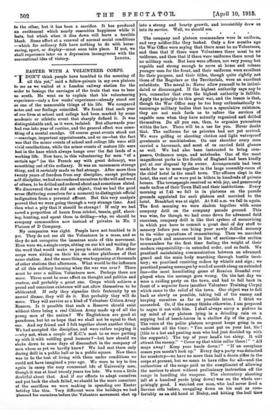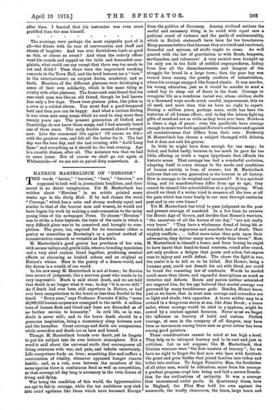EASTER WITH A VOLUNTEER CORPS.
T DON'T think people have tumbled to the meaning of 1- all this yet," said a fellow.private in my own platoon to me as we waited at a London railway station for the
order to besiege the carriages of the train that was he bear as south. He went on to explain that his volunteering experience—only a few weeks' experience—already stood out
as one of the memorable things of his life. We compared soles and our feelings coincided. We found that each year of our lives at school and college had been marked by some academic or athletic event that sharply defined it. It was distinguialiable and, as it were, isolated. But afterwards year had run into year of routine, and the general effect wee some- thing of a mental smudge. Of course great events stood out —marriage, important appointments, and so on—but the fact was that the minor events of school and college life were still vivid recollections, while the minor events of mature life were Met in the haze which always hangs over the flat lands of a working life. Now here, in this volunteering for men "of a certain age" (as the French say with great delicacy), was something out of the ordinary. It was an uncommon strange thing, and it certainly made us feel strange. After more than twenty years of freedom from any discipline, except perhaps self-discipline, we had surrendered ourselves to the will and word of others, to be drilled and ordered about and sometimes slated. We discovered that we did not object; that we had the good sense (flattering ourselves for a moment) to distinguish official indignation from a personal affront. But thin very analysis proved that we were going through a very strange time. And then what a pity that it should be strange I If only we had saved a proportion of hours from cricket, tennis, golf, shoot. big, hunting, and spent them in drilling—why, we should be company commanders now instead of privates in No. 3 Platoon of D Company.
My companion was right. People have not tumbled to it yet. They do not see all the Volunteers in a mass, and so they do not recognize the immense scale of this movement. Here were we, a single corps, Bitting on our kit and waiting for the word that would make us jump to attention. But other corps were sitting on their kit on other platforms of that same station. And the same thing was happening at thousands of other stations that afternoon. What would be the influence of all this military learning when the war was over ? There must be over a million Volunteers now. Perhaps there are more. There must be souse effect on thought and politics and custom, and probably a great one. Corps which achieve a proud and conscious existence will not allow themselves to be obliterated. If only they signalize their fraternity by an annual dinner, they will do it. But probably they will do more. They will survive as a kind of Volunteer Citizen Army Reserve. Is it possible that such a Reserve should exist without there being a real Citizen Army made up of all the young men of the nation? We Englishmen are good at paradoxes, but let us hope that we shall not be equal to that one. And my friend and I felt together about another thing. We had accepted the discipline, and were rather enjoying it —why not, when a couple of K.C.'e next to us were putting up with it with rattling good humour ?—but how should we shake down to some days of discomfort in the company of men whom as yet we hardly knew ? We had met them only daring drill in a public hall or in a public square. Now there was to be the test of living with them under conditions we could not hays imagined a year ago. We were to try to live again in camp the easy communal life of University men, though it was at least twenty years too late. We were a little doubtful about that. And if our efforts to adapt ourselves and put baok the clock failed, we should be the more COISEICiODS of the sacrifices we were making in spending our Easter holiday like this. Very different were the holidays we had planned for ourselves before the Volunteer movement shot up
into a strong and hearty growth, and irresistibly drew us into its service. Well, we should see.
• • •
The company and platoon commanders were in uniform, and very soldier-like they looked. Only a few months ago the War Office were saying that there must be no Volunteers, and then that if there were Volunteers there must be no uniforms, and then that if there were uniforms there must be no military rank. But here were officers, not very young but capable and strong enough to serve at home and release younger men for the front, and their uniforms were excellent for their purpose, and their titles, though quite rightly not those of the Regulars or the Territorials, were an excellent substitute. The moral is : Never allow yourself to be intimi- dated or discouraged. If the highest authority says nay to you, remember that even the highest authority is fallible. Apply the principle to this great war, and the lesson is that, though the War Office may be too busy enthusiastically to encourage military bodies that have a speculative existence, they are not such fools as to refuse the services of capable men when they have actually organized and drilled themselves. Do all you can, then, to organize yourselves within the law. There will be a use for you. Never doubt that. The uniforms for us privates had not yet arrived. We wore golfing or shooting clothes and light waterproof greatcoats or mackintoshes. On one shoulder every man carried a haversack, and most of us carried field glasses as well. We had also been instructed to bring com- passes, Ordnance maps, and notebooks. One of the most magnificent parks in the South of England had been kindly put at our disposal by its owner. Arrangements had been made for us to mess together in the large assembly-room of the chief hotel in the small town. The officers slept in the hotel, the rest of us were put in billets in hundreds of private houses. The townspeople received us with joy, and generously made us free of their Town Hall and their institutions. Every morning at 7.45 we fell in in platoons on the parade grounds appointed for each platoon and marched to the hotel. Breakfast was at eight. At 9.45 a.m. we fell in again. The first morning we were shaken together with some company drill on the company parade ground. This was wise, for though we had come down for advanced field exercises, company drill is like that system of memorizing in which you have to commit a great deal of dry stuff to memory before you can bring your newly drilled memory to its wider operations of remembering. Then we marched to the park and manceuvred in line of sections—the section commanders for the first time feeling the weight of their modern responsibility—in extended order, and so forth. We practised maintaining communication between an advanced guard and the main body marching through hostile terri- tory; we practised receiving orders by whistle and sign ; we practised passing messages by word of mouth along an extended line—the most humiliating game of Russian Scandal ever played when the message goes wrong. On the last day we were a raiding party on the town, and had to fall back in front of a superior force (another Volunteer Training Corps) which came to the relief of the town. Our object was to fall back as slowly as possible, taking toll of the enemy and keeping ourselves as far as possible intact. I think we succeeded. Or, if the enemy thinks otherwise, I am prepared
to argue it out with him. I shall always early a picture in my mind of my platoon lying in a drizzling rain on a sopping bed of beech-leaves in a shallow dip of the ground. The voice of the polite platoon sergeant keeps going in an undertone all the time "You most put on your hat, Sir !
[this to a hot and panting man who had just doubled up with the supports]. The top of your head's to shiny. It will attract the enemy." "Cover up that white collar there.'"" All maps away! Keep your heads down I" " If an aeroplane comes you mustn't look up." Every day a party was detached for musketry—we have no more than half a dozen rifles in the corps at present, but we mean to have rifles for all—and. the authorities of the range paid us the compliment of allowing the novices to shoot without preliminary instruction off the range in handling the weapons. The elementary shooting (all at a hundred yards lying down) was on the whole sur- prisingly good. I watched one man, who had never fived a Services rifle before, smiggling down on his mat as com- fortably as an old hand at Bible!, and hitting the bull time after time. I fancied that his instructor was even more gratified than the man himself.
• • • • • The evenings were perhaps the most enjoyable part of it all—the dinner with its roar of conversation and chaff and shouts of laughter. And was ever Southdown lamb so good as this, or cheese so sweet ? And when the orderly officer went hie rounds and rapped on the table and demanded com- plaints, what could one say except that there was too much to eat and think? Then there were the improvised smoking concerts in the Town Hall, and the brief lectures (as a" turn" in the entertainment) on outpost duties, musketry, and so forth. Members of the different platoons were developing a sense of their own solidarity, which is the same thing as rivalry with other platoons. The front-rank man found that his rear-rank man was like an old friend, though he had known him only a few days. There were platoon jokes, like jokes in a crew or a cricket eleven. You must find a good-tempered butt and then you can be happy. And what a curious feeling it was when men sang songs which we used to sing more than twenty years ago. The present generation of Oxford and Cambridge do not know those songs, and I had scarcely heard one of them since. The early doubts seemed absurd enough now. Live the communal life again ? Of course we did— with the greatest ease, and felt all the better for it. The last day was the beet day, and the last evening, with "Auld Lang Syne " and everything as it should be, the best evening. Age is a curable disease, after all. The nuisance was that we had to come home. But of course we shall go out again at Whitsuntide—if we are not on patrol duty somewhere. A.







































 Previous page
Previous page